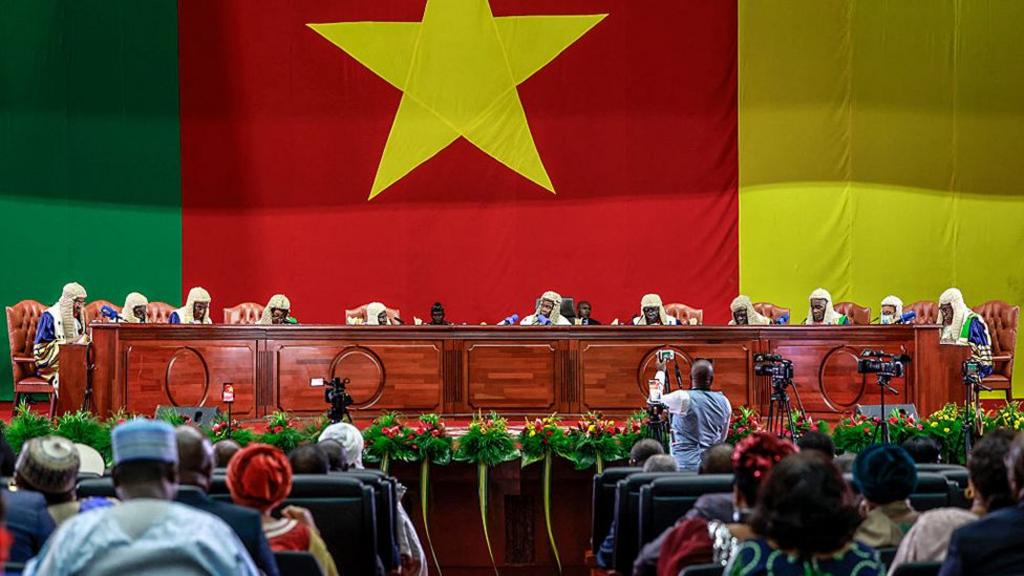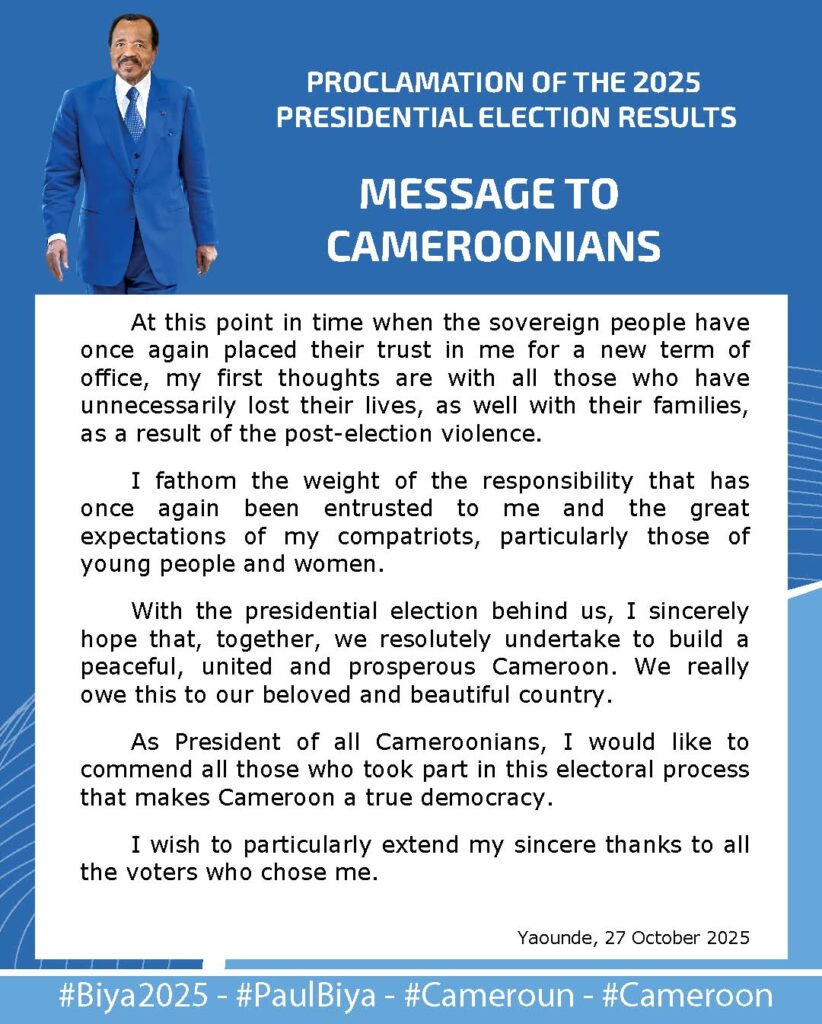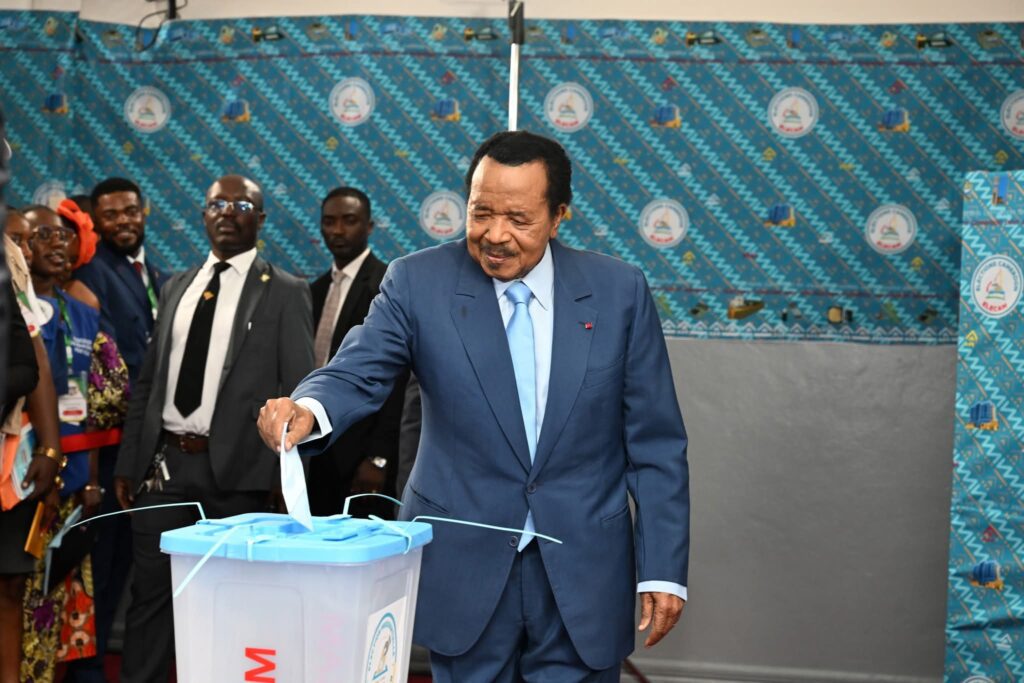The Constitutional Council has officially proclaimed President Paul Biya the winner of Cameroon’s October 12, 2025 presidential election, following the final validation of results in Yaoundé on Monday, October 27. The incumbent secured 53.66% of the total valid votes cast, extending his over four-decade leadership at the helm of the nation.
According to figures released by Elections Cameroon (ELECAM), President Biya, candidate of the Cameroon People’s Democratic Movement (CPDM/RDPC), obtained 2,474,179 votes, while his closest challenger, Issa Tchiroma Bakary of the National Front for the Salvation of Cameroon (FSNC), garnered 1,622,334 votes, representing 35.19%.
The results confirm Biya’s strong grip on power and the continued dominance of the ruling CPDM, despite a highly contested political environment.
Strong Regional Performance Secures Victory
President Biya’s victory was anchored by commanding performances across several regions, notably in the South (90.86%), Centre (70.14%), East (73.88%), and North West (86.31%) regions — all traditional strongholds of the ruling party.
In contrast, Issa Tchiroma Bakary performed strongly in the Far North (42.34%), North (43.51%), and Littoral (64.59%), showing his growing influence in the northern and urban regions. However, these regional victories were not enough to counter Biya’s broad national advantage.

The diaspora also showed mixed results: Biya won 29.14% of votes cast abroad, while Tchiroma dominated with 59.09%, reflecting a more competitive contest among Cameroonians overseas.
Opposition Faces Fragmentation
The official results reveal a fragmented opposition, with ten other candidates splitting a small share of the national vote.
* Cabral Libii of the PCRN came third with 3.42%, securing over 157,000 votes, largely concentrated in the Centre and Littoral regions.
* Bello Bouba Maigari of the UNDP followed with 2.45%, maintaining modest support in the northern regions.
* Hermine Patricia Tomaino Ndam Njoya of the UDC obtained 1.66%, while Joshua Osih of the SDF managed 1.21%, continuing the Social Democratic Front’s decline in the Anglophone regions.
* The remaining six candidates — including Ateki Seta Caxton (PAL), Iyodi Hiram Samuel (FDC), Matomba Serge Espoir (PURS), Bougha Hagbe Jacques (MCNC), Pierre Kwemo (UMS), and Akere Muna (UNIVERS) — each secured less than 1% of the national vote.
Analysts say the dispersion of opposition votes among multiple candidates significantly weakened the challenge to the incumbent.
Voter Trends and Political Implications
The 2025 election results reaffirm the CPDM’s strong rural base, especially in the Centre, South, and East regions, where President Biya remains deeply popular for his long-standing promise of stability and peace.
In contrast, Issa Tchiroma’s campaign gained traction among younger and northern voters calling for change, particularly in the Littoral and Far North regions. His early self-declaration of victory, however, was dismissed by the Constitutional Council as “premature and unfounded.”
Political observers note that while Tchiroma has emerged as the strongest opposition figure, his campaign was unable to unite other opposition leaders or mount a coordinated national strategy.
National Calm Amid Tight Security
As results were announced, the capital Yaoundé remained calm, though most shops and schools were closed as a precaution against unrest. In Douala, tensions flared over the weekend and Monday, with four reported deaths following clashes between protesters and security forces.
Authorities, led by the Governor of the Littoral Region, Samuel Ivaha Diboua, condemned the violence and reaffirmed that “order will be maintained and the rule of law enforced.”
Continuity and Stability Ahead
With this victory, President Paul Biya, now 92 years old, begins his eighth consecutive term, extending a leadership that began in 1982.

In his message to the nation on Facebook, President Biya reiterated his commitment to peace, unity, and development, calling on all Cameroonians — both supporters and opponents — to work together for the nation’s future:
“The time has come to turn the page of division and focus on building a stronger, more prosperous Cameroon.”
For many of his supporters, the 2025 election result is a vote for continuity — a clear signal that Cameroonians prefer stability over disruption, and experience over uncertainty.

